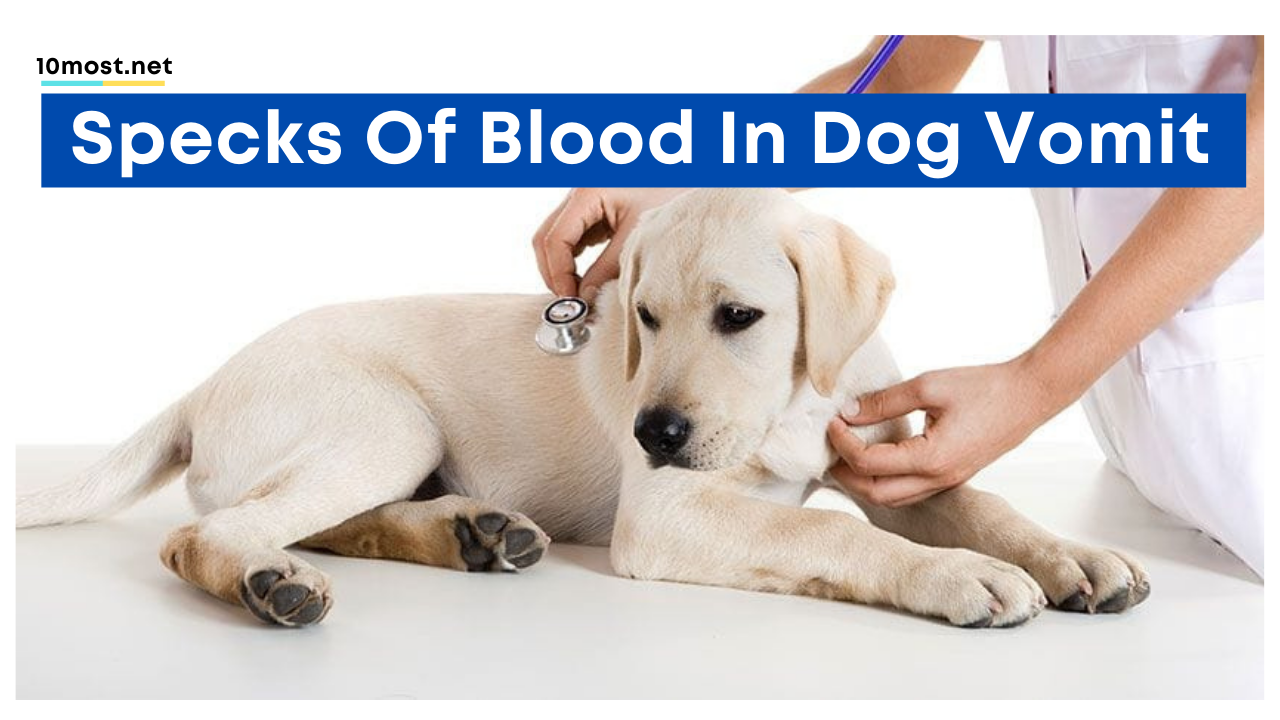Specks of blood in dog vomit- All things you should know (Hematemesis)
Dogs vomiting blood can be a good sign or a bad one. It doesn’t mean they’re going to die, nor does it mean they have cancer. In many cases, there’s a process in the stomach that causes some bleeding which eventually makes your dog throw up. Other times, the vomiting of blood could come from inhaling or swallowing food accidentally and then throwing it up later.
Hematemesis is relatively common in dogs and can affect various systems depending on the source. For example, an injury or illness may lead to vomiting blood when it comes to the gastrointestinal system.
Symptoms and Types
Vomiting blood is a symptom that might appear in dogs due to various issues and conditions. The blood may seem bright red, clump together or resemble coffee grounds when digested. Other symptoms can include loss of appetite (anorexia), abdominal pain, and blackened (melena).
Suppose your dog is losing blood through vomiting. In that case, this might be associated with anaemia, which could cause additional signs to come into play, such as irregularities in the heart’s rhythm, weakness leading to collapse, rapid heartbeat and other serious health problems.

Causes
A wide variety of illnesses and infections can cause hematemesis. Gastrointestinal diseases, such as inflamed bowels from inflammatory bowel disease (IBD), or ulcers, can both be causes for hematemesis. Various metabolic, neurological, respiratory and viral infections may be responsible for incidents of hematemesis. Ingestion of toxins, including household cleaners, is a common cause of hematemesis in dogs.
Coagulopathy or lack of proper blood clotting due to liver failure or a reduced blood platelet count (thrombocytopenia) may result from a toxin or drug exposure.
Hematemesis can also be the result of trauma, such as an accident or being hit by a car; severe burns due to a house fire; heatstroke from playing in the sun for long periods; high-risk surgery after being burned or harmed in some other way; exposure to highly poisonous substances like lead or iron; and serious toxic plant poisoning. Snake bites are another cause of improper blood clotting in dogs.
Animals that are acutely ill are more vulnerable to gastrointestinal (GI) bleeding. Other risk factors that can lead to GI bleeding include NSAIDs, nonsteroidal anti-inflammatories; shock; and diseases such as thrombocytopenia—a reduced blood platelet count.
Diagnosis
Tests used to diagnose a person’s symptoms can be complicated and invasive, but they can also be very effective at uncovering the cause of symptoms. Blood tests, along with other forms of analysis of urine and faecal matter, can pinpoint inner disturbances which under normal circumstances, would remain hidden from plain view without the help of medical testing.
It is essential to distinguish any number of toxic substances that may have been ingested or otherwise come into contact with blood, as well as cancerous growths that may have already spread from their original location at the time these types of tests are performed. The diagnosis for hematemesis could range anywhere from being caused by toxic substances to cancerous cells manifesting in an otherwise healthy person.
Treatment
A treatment plan will depend on the cause of hematemesis. If any underlying causes need to be treated, then these should be identified and treated upon diagnosis. Once vomiting is no longer excessive and has subsided, recovery may continue at home, with or without ongoing care, depending on the severity of the case.
For severe internal bleeding, ulcer perforations or excessive vomiting that requires emergency hospitalization in which blood loss needs to be halted, there may be the need for emergency surgery to repair any damaged areas or address excess internal bleeding, transfusion of red blood cells or intravenous fluids replacement therapy to replace what has been lost as a consequence of all this vomiting and mouth bleeding.
When you pick up your pet from the vet, your pet will be on medications for several issues. These may include some to relieve nausea, pills to help with stomach ulcers, and others for indigestion. Your vet will send those home with you to continue administering those medications at home.

Living and Management
By following a diet of easily digestible foods, such as boiled chicken and white rice, your pet can get back on the mend sooner. An appropriately bland and easy to digest food helps the digestive system heal itself after such an illness and ensures that your dog won’t feel nauseous from eating anything too rich too soon during their recovery.
Discuss your pet’s situation with a vet who can tell you what is best for them, specifically depending on what caused the vomiting and how it was treated. Every case is different and will require varying degrees of care.
Prevention
Toxic substances can be ingested by different animals when they have access to poisonous plants, foods and chemicals. If your pet can vomit up blood (hematemesis) in dogs, this can become a very serious health concern very quickly—call your veterinarian immediately if this is the case.
- How To Keep Dog Warm In Winter?(8 Tips)
- What To Do If Your Dog Eats Chicken Bones?(100% Solution)
- Why Do Dogs Lay On Your Feet?(Top 3 Reasons)
- How To Get Rid Of Dog Hiccups?(Secret Reveal)

